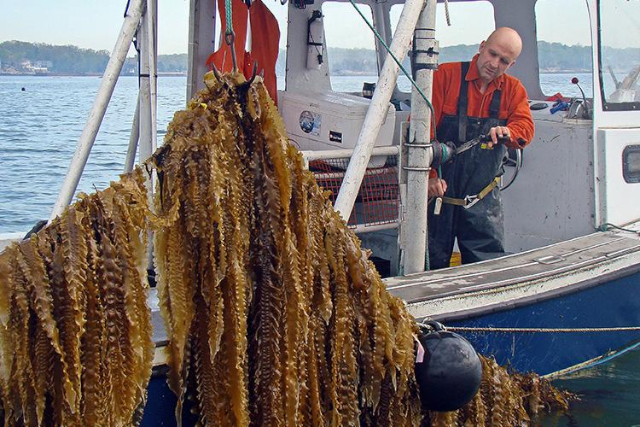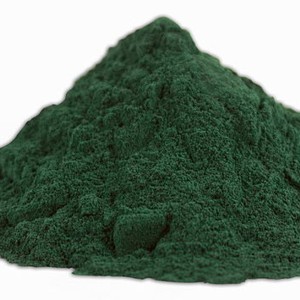By 2050, we’ll be in the grasp of a food revolution – one we didn’t ask for, but which was thrust upon us by climate change and the increasing need for sustainability in food production. We’ll be eating more Plant Proteins – and they’ll include seaweeds…
 New England Brown Sugar Kelp is either gathered wild by divers,
New England Brown Sugar Kelp is either gathered wild by divers,
or farmed (as shown above) on hanging ropes.
I know it sounds unwholesome – eating seaweed – especially to anyone who’s stood out on a beach and smelled the decomposing detritus left behind by the most recent high tide. But that’s not what seaweed is really all about. Just ask the Japanese: They’ve been eating it for centuries, and they’re pretty darned healthy!
Benefits of Red Seaweeds unveiled
Researchers at the University of Illinois have uncovered the secrets of red seaweeds – which have been popular as foods in Asian communities for thousands of years.
“In the past, people have wondered why the number of colon cancer patients in Japan is the lowest in the world,” said Dr. Yong-Su Jin, a professor of food microbiology. “Many assumed that it was due to some aspect of the Japanese diet or lifestyle. We wanted to ask whether their seaweed diet was connected to the lower frequency of colon cancer.”
The team used enzymes to parse, or break down the structure of red seaweeds and then ran tests to determine which components of the aquatic plants produced health benefits. Two compounds, agarotriose and 3,6-anhydro-L-galactose, (AHG) showed significant promise.
“We found that AHG specifically inhibits the growth of human colon cancer cells and does not affect the growth of normal cells,” Dr. Eun Ju Yun says. “The anti-cancer activity of AHG is due to its ability to trigger apoptosis or cell death.”
The next step is to carry out further experiments, Dr. Kyoung Heon Kim says: “Our work explains why red seaweeds are beneficial by providing the molecular mechanism. We will continue studying their function in animal models and hopefully we will be able to use them as a therapeutic agent in the future.”
Or, maybe, we should just start developing a taste for red seaweeds now…
Sugar Kelp shows significant health benefits
A research team at The University of Connecticut wanted to determine what, if any, beneficial effects extracts of new England brown sugar kelp (Saccharina latissima) might have.
According to an abstract of the team’s report: “[The researchers] studied the differences between three groups of mouse models. They placed two on high-fat diets but incorporated sugar kelp, a kind of seaweed, into the diet of one. The third group was on a low-fat diet as a healthy control. The group that ate sugar kelp had lower body weight and less adipose tissue inflammation — a key factor in a host of obesity-related diseases — than the other high-fat group.”
Te researchers also found that brown sugar kelp inhibits hepatic inflammation and fibrosis in a mouse model of diet-induced non-alcoholic steatohepatitis, a fatty liver disease.
Team leaders Dr. Ji-Young Lee and Dr. Young-Ki Park initially wanted to determine the dietary benefits of seaweed, gathering and cultivation of which is a fast-growing industry, especially in Connecticut, where there is so much commercial activity around brown sugar kelp that the state has imposed regulations on seaweeds to ensure that they don’t carry high levels of heavy metals they might absorb from seawater.
Lee and Park wanted to get the ball rolling on research they hoped would reveal even more benefits, encouraging consumers to eat more seaweed.
“Consumers these days are getting smarter and smarter,” Lee says. “The nutritional aspect is really important for the growth of the seaweed industry in Connecticut.”
My take
Japan, in particular, has historically enjoyed a notoriously low incidence of several types of particularly virulent cancer, including colon and breast cancer. And, if eating brown sugar kelp can help people control weight gain, it’s something we should all be thinking about adding to our diets.
But what about vitamin and mineral content? How nutritionally rich is the vegetable protein in various species of seaweed?
Just a note: Spirulina (see photo top of page) is a bright green algae which is a very close cousin to seaweeds. It, too, has undergone some intensive examination over the past decade or so, and has been found to offer significant health benefits. Spirulina extracts and powders are widely available through supplement dealers.
I know the Japanese, in particular, consume seaweed in many ways, in many dishes, from soup to sushi. But what other ways are there to enjoy seaweed? Unfortunately… Unless you present consumers with a wide variety of ways to use seaweed in the kitchen, I strongly suspect they’ll continue to see it as a medicinal or therapeutic food, rather than something to enjoy every day…
~Maggie J.

